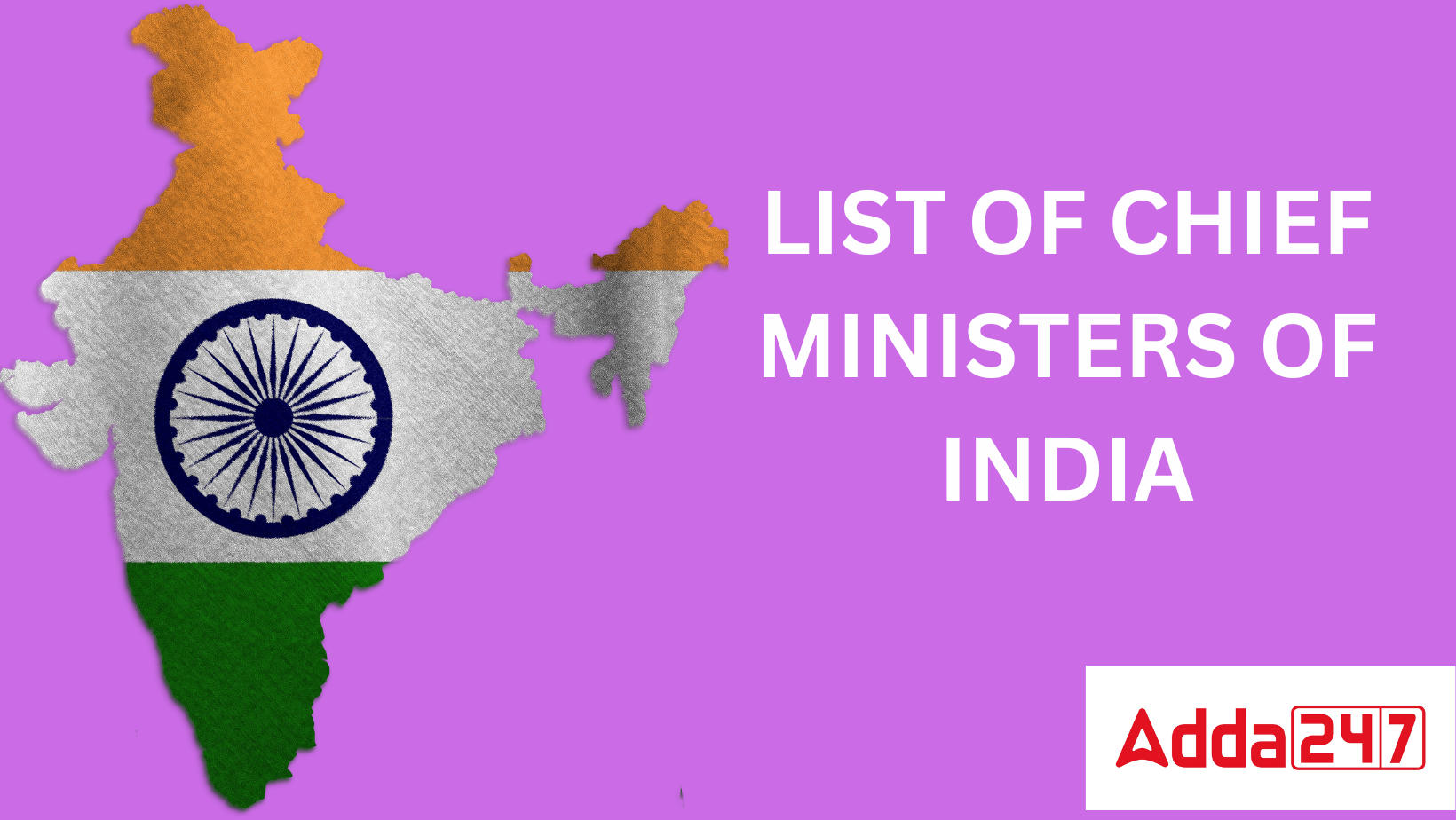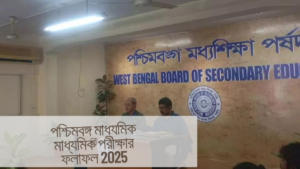Table of Contents
Chief Ministers of India 2022
Chief Ministers of India: As of 2022, India has a total of 28 states and 8 union territories. Chief ministers serve as the executive authority in charge of administration and governance in the 28 states and 2 union territories. The general awareness segment of the majority of competitive tests, including the NEET, CUET, and other exams, includes this crucial and highly-scoring topic. The most recent list of Indian chief ministers, current as of July 2022, is provided in this article.
List of Chief Ministers of India 2022
India is a large country made up of many states and union territories. Different Chief Ministers supervise the operations of various states. The table below gives all the details of the current chief ministers of India.
| S.No | State and Union Territory | Chief Minister | Took in Office | Party |
|---|---|---|---|---|
| 1 | Andhra Pradesh | Y. S. Jaganmohan Reddy | 30/05/2019 | YSR Congress Party |
| 2 | Arunachal Pradesh | Pema Khandu | 17/07/2016 | Bharatiya Janata Party |
| 3 | Assam | Himanta Biswa Sarma | 10/05/2021 | Bharatiya Janata Party |
| 4 | Bihar | Shri Nitish Kumar | 22/02/2015 | Janata Dal (United) |
| 5 | Chhattisgarh | Bhupesh Baghel | 17/12/2018 | Indian National Congress |
| 6 | Delhi (NCT) | Shri Arvind Kejriwal | 14/02/2015 | Aam Aadmi Party |
| 7 | Goa | Pramod Sawant | 19/03/2019 | Bharatiya Janata Party |
| 8 | Gujarat | Shri Vijaybhai R. Rupani | 07/08/2016 | Bharatiya Janata Party |
| 9 | Haryana | Shri Manohar Lal Khattar | 26/10/2014 | Bharatiya Janata Party |
| 10 | Himachal Pradesh | Jai Ram Thakur | 27/12/2017 | Bharatiya Janata Party |
| 11 | Jammu and Kashmir | Governor’s Rule | 31/10/2019 | – |
| 12 | Jharkhand | Shri Hemant Soren Dumka | 29/12/2019 | Jharkhand Mukti Morcha |
| 13 | Karnataka | Basavaraj Bommai | 28/07/2021 | Bharatiya Janata Party |
| 14 | Kerala | Shri Pinarayi Vijayan | 25/05/2016 | Communist Party of India (Marxist) |
| 15 | Ladakh (UT) | President’s Rule | 31/10/2019 | — |
| 16 | Madhya Pradesh | Shri Shivraj Singh Chouhan | 23/03/2020 | Bharatiya Janata Party |
| 17 | Maharashtra | Eknath Shinde | 30/06/2022 | Shiv Sena |
| 18 | Manipur | Shri Nongthombam Biren Singh | 15/03/2017 | Bharatiya Janata Party |
| 19 | Meghalaya | Shri Conrad Sangma | 06/03/2018 | National People’s Party |
| 20 | Mizoram | Shri Zoramthanga | 15/12/2018 | Mizoram National Front |
| 21 | Nagaland | Shri Neiphiu Rio | 08/03/2018 | Nationalist Democratic Progressive Party |
| 22 | Odisha | Shri Naveen Patnaik | 05/03/2000 | Biju Janata Dal |
| 23 | Puducherry (UT) | N. Rangaswamy | 07/05/2021 | All India N.R. Congress |
| 24 | Punjab | Bhagwant Mann | 16/03/2022 | Aam Aadmi Party |
| 25 | Rajasthan | Shri Ashok Gehlot | 17/12/2018 | Indian National Congress |
| 26 | Sikkim | Shri Prem Singh Tamang | 27/05/2019 | Sikkim Krantikari Morcha |
| 27 | Tamil Nadu | M. K. Stalin | 07/05/2021 | Dravida Munnetra Kazhagam |
| 28 | Telangana | Shri K Chandrasekhar Rao | 02/06/2014 | Telangana Rashtra Samithi |
| 29 | Tripura | Shri Biplab Kumar Deb | 09/03/2018 | Bharatiya Janata Party |
| 30 | Uttar Pradesh | Shri Yogi Adityanath | 19/03/2017 | Bharatiya Janata Party |
| 31 | Uttarakhand | Pushkar Singh Dhami | 03/07/2021 | Bharatiya Janata Party |
| 32 | West Bengal | Km. Mamata Banerjee | 20/05/2011 | All India Trinamool Congress |
| 33 | Andaman and nicobar (UT) | President’s Rule | 01/11/1956 |
Chief Ministers of India 2022- Powers and responsibilities
The chief minister or CM has the following powers and responsibilities in the state government:
- The governor receives the list of suggested candidates through the CM of that state for his council of ministers.
- The chosen ministers receive portfolios from the CM.
- The CM is in charge of the council of ministers and has the authority to dissolve it with notice.
- The CM serves as a link between the governor and the council of ministers.
- The CM serves as the state board’s chairman.
- The state’s main spokesperson is CM.
Chief Ministers of India 2022- Some important facts
- The only female chief minister currently serving in India is Mamata Banerjee of West Bengal.
- The country of India’s first female chief minister was Sucheta Kripalini. From 1963 until 1967, she presided as Uttar Pradesh’s chief minister.
- The longest-serving chief executive was Pawan Kumar Chamling, who headed Sikkim for 24 years.
- Naveen Patnaik has held the position of chief minister of Odhisa since the year 2000, making him the chief minister with the longest tenure among the present chief ministers.
- Mizoram’s chief minister is Zoramthanga, the oldest active chief minister.
- Pema Khandu, the chief minister of Arunachal Pradesh, is the youngest one currently in office.
- Nitish Kumar, the chief minister of Bihar, has held the position of chief minister of state most times. He won all of the votes. He was elected a total of 7 times.
How is the Chief Ministers of India 2022 appointed?
The Indian Constitution makes no reference to the Prime Minister’s appointment provisions, and the same is true for the Chief Minister’s appointment requirements. The Indian Constitution’s Article 164 states that the Governor appoints the Chief Minister. The Governor must adhere to a rule and cannot simply choose anyone to serve as Chief Minister.
The chief minister of the state is chosen from among the members of the party with the most votes in the assembly elections.
Important note:
- The governor uses his own judgement and appoints a Chief Minister when no party wins a majority in the polls.
- In the event that no party receives a majority of the votes, the governor picks a representative from the largest party or, in the event of a coalition, one from it, as the Chief Minister. He then has one month to win the house’s support.
- However, the ruling party usually proposes a member, and the governor often appoints that person as the Chief Minister. If the incumbent dies in office, the governor may, at his discretion, appoint a Chief Minister. Then, within a set period of time, this person must demonstrate confidence.
Facilities availed by the Chief Ministers of India
Medical services, residential amenities, phone and electricity bill reimbursements, travel accommodations, and many other things may be provided to the chief minister of a state. Since these are explicitly outlined in each state’s legislature, the amount allocated to the Chief Minister for each of these facilities differs from one state to the next.
- Medical facilities: According to the Medical Attendance Rules, the Chief Minister is entitled to free medical care, reimbursement, and free lodging in any government-run hospitals and other designated referral facilities.
- Residence facilities: The Chief Minister is entitled to a luxurious, rent-free home. However, the sum may differ in other states. The value of the house rental is given to the Chief Minister in the event that he or she chooses to stay in their own home.
- Reimbursement: The Chief Minister is entitled to a certain sum of money in reimbursement for monthly phone call expenses. The Chief Minister receives a certain number of free electricity units each month for his or her use.
- Traveling charges: Each year, the Chief Minister is given a set sum of money to cover travel costs inside the country’s borders. According to Article 164 of the Indian Constitution, this sum also changes. A limited amount of free travel per year is also available to the Chief Minister’s family members.
List of Chief Ministers of India- FAQs
Que. Who is the lady chief minister of India?
Ans. Mamata Banerjee of West Bengal is the only incumbent female chief minister in India.
Que. Who is the first chief minister of India?
Ans. The First Chief Minister of India was Shri Krishna Sinha.
Que. Who is the youngest chief minister?
Ans. Pema Khandu, the chief minister of Arunachal Pradesh, is the youngest one currently in office.
Que. Who is the oldest chief minister of India?
Ans. Zoramthanga is the oldest chief minister who is currently serving as Mizoram’s CM.
Que. Who appoints CM?
Ans. The Chief Minister is appointed by the Governor who also appoints other ministers on the advice of the Chief Minister.



 Does 12th Marks Important For CUET 2025?...
Does 12th Marks Important For CUET 2025?...
 West Bengal Madhyamik Result 2025 Date a...
West Bengal Madhyamik Result 2025 Date a...
 CUET UG Date Sheet 2025 @cuet.nta.nic.in...
CUET UG Date Sheet 2025 @cuet.nta.nic.in...










